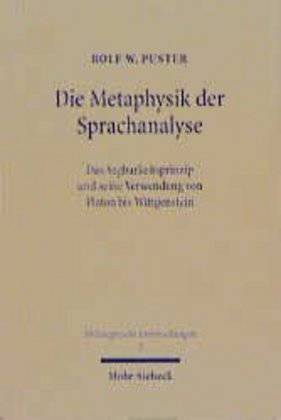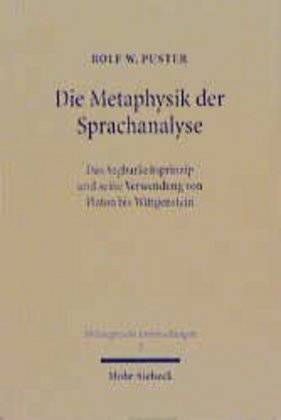
Je cadeautjes zeker op tijd in huis hebben voor de feestdagen? Kom langs in onze winkels en vind het perfecte geschenk!
- Afhalen na 1 uur in een winkel met voorraad
- Gratis thuislevering in België vanaf € 30
- Ruim aanbod met 7 miljoen producten
Je cadeautjes zeker op tijd in huis hebben voor de feestdagen? Kom langs in onze winkels en vind het perfecte geschenk!
- Afhalen na 1 uur in een winkel met voorraad
- Gratis thuislevering in België vanaf € 30
- Ruim aanbod met 7 miljoen producten
Zoeken
Die Metaphysik Der Sprachanalyse
Zur Verwendung Des Sagbarkeitsprinzips Von Platon Bis Wittgenstein
Rolf W Puster
€ 62,45
+ 124 punten
Omschrijving
The Metaphysics of Ordinary Language Philosophy. The Application of the Principle of Expressibility from Plato to Wittgenstein.
(Text in German)
Since ordinary language philosophy is widely regarded as a philosophical trend of the 20th century having a critical or even anti-metaphysical attitude, its significance for history and also for metaphysics has often been underestimated. In fact, three typical arguments used in ordinary language philosophy - substitution tests, sequence formation tests and language game tests - are based on a metaphysical principle: the principle of expressibility.
In this work, the author shows that these arguments are not only used in the 20th century but that they have also been found in classical philosophical texts since Plato.
(Text in German)
Since ordinary language philosophy is widely regarded as a philosophical trend of the 20th century having a critical or even anti-metaphysical attitude, its significance for history and also for metaphysics has often been underestimated. In fact, three typical arguments used in ordinary language philosophy - substitution tests, sequence formation tests and language game tests - are based on a metaphysical principle: the principle of expressibility.
In this work, the author shows that these arguments are not only used in the 20th century but that they have also been found in classical philosophical texts since Plato.
Specificaties
Betrokkenen
- Auteur(s):
- Uitgeverij:
Inhoud
- Aantal bladzijden:
- 299
- Taal:
- Duits
- Reeks:
- Reeksnummer:
- nr. 2
Eigenschappen
- Productcode (EAN):
- 9783161468049
- Verschijningsdatum:
- 1/08/1997
- Uitvoering:
- Paperback
- Formaat:
- Trade paperback (VS)
- Afmetingen:
- 155 mm x 234 mm
- Gewicht:
- 475 g

Alleen bij Standaard Boekhandel
+ 124 punten op je klantenkaart van Standaard Boekhandel
Beoordelingen
We publiceren alleen reviews die voldoen aan de voorwaarden voor reviews. Bekijk onze voorwaarden voor reviews.









